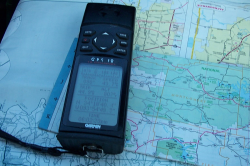
— Drivers in the UK faced a scary sight when the voice coming from their GPS devices told them to go three miles out of the way near a village called Crackpot.
Buses, trucks, and every type of vehicle had to drive on a gravel road with a steep cliff. Residents said they often saw vehicles trying to back out of the mess only to discover the vehicles, and their drivers, were still lost.
In New Jersey, a wrong-way driver crashed into a motorcycle after the 2009 Honda Accord turned onto the highway and traveled south in the northbound lanes. Both vehicles hit head-on, with the accident blamed on the Accord driver following his GPS.
In 2010, a driver from Ohio followed the directions from her GPS and did exactly what the device said to do: turn right. The problem occurred when the right turn took the woman down train tracks where her vehicle got stuck. The woman exited the car about a minute before it was struck by a train.
And in 2008, 21 students took a trip to the hospital after the driver of their charter bus followed instructions from the GPS to drive the 12-foot-high bus into a 9-foot-high tunnel. Fortunately, none of the students were seriously injured when the accident sliced off the roof of the bus.
While consumers depend more on vehicle technology, experts agree that too many people are putting their trust in a device instead of using simple common sense.
A GPS device is only as good as the information it contains, and if that information is outdated or wrong, it’s no different than using an old road map. Additionally, a GPS wants to take you the shortest possible route, even if there are obstacles in the way that any human eye would normally see.
The Automobile Association (AA) of the UK has conducted research into the problem and found that 60 percent of drivers in England got lost in one year, and leading the get-lost pack were younger drivers. The AA blamed the problem on younger drivers who relied too much on their GPS devices instead of following a road map.
According to AA, 82 percent of drivers 18-24 years old got lost in one year, the same age group least likely to carry a road map. Dubbed the “Playstation generation,” AA said that younger drivers follow what their GPS tells them without paying attention to their surroundings while driving.
A 2011 report from the British Royal Academy of Engineering warned that an over-reliance on GPS technology could lead to loss of life, suggesting that a new generation of drivers not only can’t read a road map but would be totally lost without the familiar voice from their GPS.
Experts agree the technology is here to stay and will only grow over time, but we should treat the device as a tool, not an almighty know-it-all.
Follow the manufacturer guidelines to keep the device updated, but keep in mind that it’s the driver who chooses how to use the tool.
Purchase a current road map before any unfamiliar trip and be prepared to plan your trip using the map, not the voice coming from the GPS. If you’re in an accident, it’s guaranteed the GPS won’t be the one who must stand before a judge.




